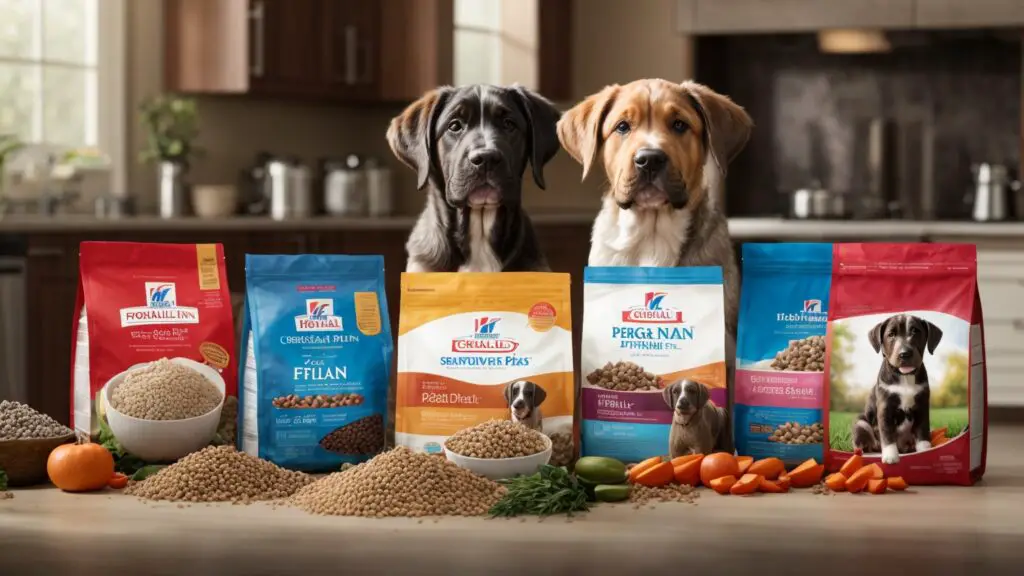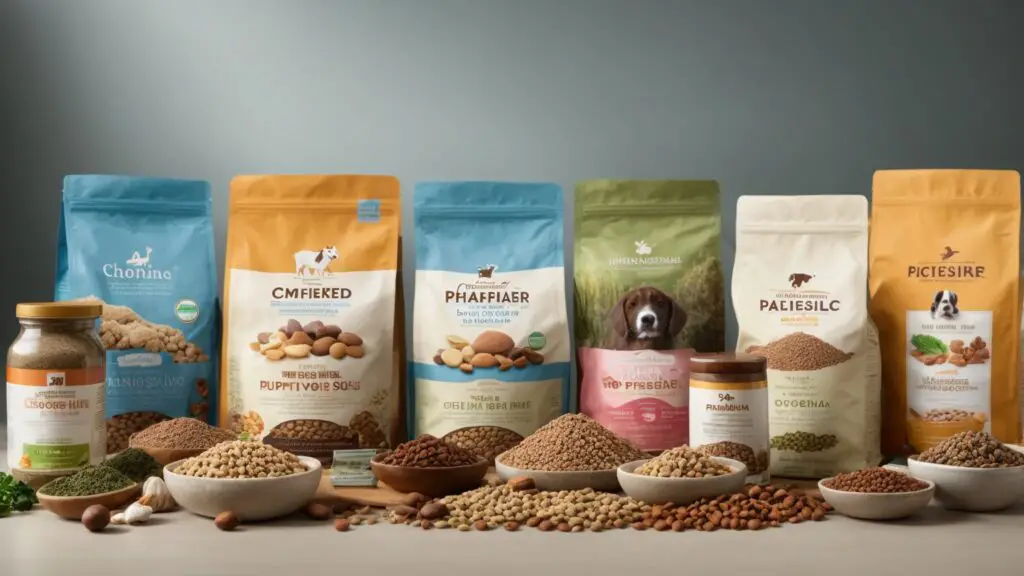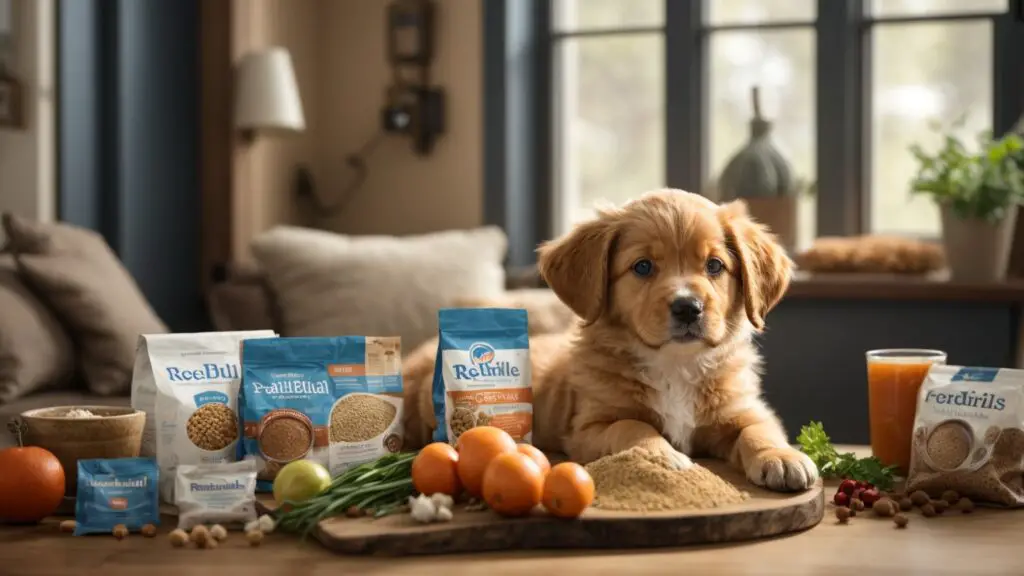Estimated reading time: 16 minutes
Introduction
Selecting the best puppy food for your young canine companion is a decision that resonates far beyond just satisfying their immediate hunger. It lays the foundation for their long-term health and well-being. Just like human babies, puppies have specific nutritional needs that must be met to ensure their proper growth and development. This is about filling their bellies and nurturing their bodies and minds. The right puppy food can significantly influence their physical development, energy levels, and overall health.
In the diverse world of pet nutrition, the array of options can be overwhelming. From dry kibble to wet food, organic blends to those rich in specific nutrients, making an informed choice is crucial. It’s not just about picking a brand; it’s about understanding what each type of food offers and how it aligns with your puppy’s needs. The best puppy food should provide a complete and balanced diet, established by standards like those set by the Association of American Feed Control Officials (AAFCO).
Moreover, the choice of puppy food has long-lasting effects. The nutrition your puppy receives in the first months of life sets the stage for their adult health. Puppies have different nutritional requirements than adult dogs, and meeting these early on is critical to preventing future health issues. It’s about laying a solid nutritional foundation that supports their growth and their journey toward a healthy, active, and fulfilled life.
Key Takeaways
- Understanding the Nutritional Requirements of Puppies: Essential for their growth and overall well-being.
- Evaluating Top Puppy Food Brands and Types: Critical for finding the most suitable diet for your puppy.
- Insights from Veterinary Professionals and Dog Nutrition Experts: Provide valuable guidance in selecting the right food.
Understanding Puppy Nutrition: Foundations of Healthy Growth
The Importance of Proper Nutrition in Early Stages of a Puppy’s Life
Proper nutrition is paramount in the early stages of a puppy’s life, serving as the cornerstone for their overall health and development. Ensuring that your puppy’s diet meets their nutritional needs is not just about growth; it’s about laying the groundwork for a healthy, vibrant future. Puppies, like human babies, require specific nutrients to thrive. These early dietary choices significantly impact their lifelong health, emphasizing the importance of choosing the best puppy food.
Case Study: In a compelling case study, we observe the transformation of a Labrador puppy named Bella. Initially fed generic puppy food, Bella experienced lethargy and poor coat quality. However, after switching to a high-quality puppy food formulated explicitly for her breed and size, Bella’s energy levels soared, and her coat became glossy and healthy. This case underscores the impact of diet on a puppy’s overall well-being.
Vital Nutrients for Puppies: Discussion on Essential Nutrients for Puppy Growth
Essential Nutrients and Their Benefits:
- Protein: Crucial for muscle growth and repair.
- Fats: Provide energy and support brain development.
- Carbohydrates: Offer a sustainable energy source.
- Vitamins and Minerals: Essential for immune system support and bone growth.
Common Nutritional Deficiencies: Addressing Possible Deficiencies in Puppy Diets
It’s vital to be aware of common nutritional deficiencies in puppies, such as calcium and phosphorus imbalance, which can lead to bone disorders. Ensuring a complete and balanced diet is critical for preventing these issues.
Integrating Supplements: When and How to Use Supplements
While high-quality puppy food should provide most of the necessary nutrients, in some cases, supplements may be needed, especially for puppies with specific health conditions or dietary restrictions.
Understanding and providing the proper nutrition is fundamental in a puppy’s early life. A well-balanced diet, rich in essential nutrients, sets the stage for a healthy, active, and fulfilling life.
Dry vs. Wet: Choosing the Right Puppy Food
Overview of Dry and Wet Puppy Food Options
When it comes to feeding your puppy, one of the first decisions you’ll face is choosing between dry and wet food. Both types have benefits and can be suitable for different puppies depending on their needs and preferences. Dry food, often called kibble, is convenient and great for dental health, while wet food is highly palatable and can be better for hydration.
List: Advantages and Disadvantages of Both Food Types
- Dry Food:
- Advantages: Helps with dental health, convenient storage, often more economical.
- Disadvantages: Less palatable for some puppies, can lack moisture.
- Wet Food:
- Advantages: Higher moisture content, can be more appealing to picky eaters.
- Disadvantages: More expensive, shorter shelf life once opened.
Hydration and Puppy Food Choices: The Role of Water in Puppy Diets
Proper hydration is crucial for puppies and food choice plays a significant role. Wet food can be a beneficial source of moisture, especially for puppies who don’t drink enough water. However, when accompanied by adequate water intake, dry food can also be part of a well-hydrated diet.
“A balanced diet is key, whether you choose dry or wet food. Pay attention to your puppy’s specific needs and preferences,” advises a veterinarian.
Transitioning Between Food Types: Best Practices for Switching Food Types
When transitioning your puppy from one type of food to another, it’s essential to do it gradually. Mix increasing amounts of the new food with the old over 7-10 days to prevent digestive upset.
Puppy Food Allergies and Sensitivities: Identifying and Managing Food Allergies
Be aware of any signs of food allergies or sensitivities in your puppy, such as itching or gastrointestinal upset. Consult your veterinarian for guidance on hypoallergenic food options if needed.
The choice between dry and wet puppy food should be based on your puppy’s health, dietary needs, and personal preference. Both types have advantages; the best choice ensures a complete and balanced diet for your growing puppy.

Vet-Recommended Brands: Trusted Choices for Your Puppy
The Value of Choosing Vet-Recommended Brands
Selecting vet-recommended puppy food brands ensures your puppy’s health and growth. Veterinarians often recommend specific brands based on their nutritional content, quality of ingredients, and suitability for different breeds and life stages. These brands are typically formulated to meet the dietary requirements established by the Association of American Feed Control Officials (AAFCO) and other regulatory bodies.
List: Popular Vet-Recommended Puppy Food Brands
- Hill’s Science Diet: Known for its scientifically formulated recipes.
- Royal Canin: Offers breed-specific formulas.
- Purina Pro Plan: A range catering to different dietary needs.
- Blue Buffalo: Focuses on natural ingredients.
Analyzing Ingredients in Vet-Recommended Foods: Understanding Ingredient Labels
Reading and understanding ingredient labels is crucial when choosing puppy food. Look for high-quality protein sources like chicken or fish as the first ingredient, and ensure the food contains a balance of proteins, fats, carbohydrates, vitamins, and minerals.
Cost vs. Quality in Puppy Food: Balancing Budget and Nutritional Value
While vet-recommended brands might have a higher price tag, they often offer superior nutritional value. Balancing cost and quality is essential; investing in a high-quality diet can lead to better health and potentially lower veterinary bills in the long run.
“As a veterinarian, I recommend choosing a brand that aligns with your puppy’s specific needs. Look for brands with high-quality ingredients and a proven track record,” says a veterinary expert.
Choosing the right puppy food brand involves considering veterinary recommendations, understanding ingredient labels, and balancing cost with quality. Opting for a vet-recommended brand can significantly improve your puppy’s health and development.
Puppy Food for Large Breeds: Special Dietary Considerations
Unique Dietary Needs of Large Breed Puppies
Large breed puppies, such as German Shepherds and Great Danes, require specialized diets to ensure healthy growth and development. These puppies proliferate and are prone to specific health issues if not fed appropriately. Choosing the right puppy food for large breeds is crucial to support their bone health and overall well-being.
List: Specific Nutrients Important for Large Breeds
- Controlled Caloric Intake: Prevents excessive weight gain.
- Optimal Calcium to Phosphorus Ratio: Ensures proper bone development.
- High-Quality Protein Sources: Supports muscle growth.
- DHA and Omega-3 Fatty Acids: Aid in brain and eye development.
Recommended Foods for Large Breed Puppies: Top Food Choices
- Eukanuba Large Breed Puppy Food
- Iams ProActive Health Smart Puppy Large Breed
- Royal Canin Large Puppy Dry Dog Food
Case Study: A case study of a Labrador Retriever named Duke illustrates the impact of diet on large breed puppies. Initially struggling with joint issues, Duke’s health improved remarkably after switching to a diet specifically formulated for large-breed puppies, highlighting the importance of appropriate nutrition.
Managing Weight in Large Breed Puppies: Tips for Weight Management
Careful monitoring of food intake and portion sizes is critical to preventing obesity. Regular weigh-ins and adjustments to food portions based on growth and activity levels are essential.
Exercise and Diet in Large Breeds: The Relationship Between Activity and Nutrition
Balancing diet with appropriate exercise is crucial for large-breed puppies. Adequate physical activity supports healthy growth and prevents obesity and joint stress.
The dietary needs of large-breed puppies are distinct and must be carefully managed to ensure their healthy development. Selecting a diet that caters to their specific growth requirements, regular exercise, and weight management is essential for their long-term health and well-being.

Healthiest Puppy Foods: What Experts Say
Criteria for Defining ‘Healthiest’ Puppy Foods
Determining the “healthiest” puppy foods involves understanding the specific nutritional needs of growing puppies. Experts agree that the best puppy foods should provide a complete and balanced diet formulated to meet the standards established by the Association of American Feed Control Officials (AAFCO). This means balancing proteins, fats, carbohydrates, vitamins, and minerals to support healthy growth and development.
List: Characteristics of High-Quality Puppy Foods
- High in quality protein sources like chicken, beef, or fish.
- Contains DHA for brain and eye development.
- It is enriched with essential vitamins and minerals.
- Free from artificial colors, flavors, and preservatives.
- Appropriate for the puppy’s breed size and life stage.
The Role of Organic Ingredients: Benefits of Organic Foods
Organic puppy foods are gaining popularity due to their minimal use of synthetic pesticides and fertilizers, non-GMO ingredients, and often higher-quality meat and vegetable contents. These aspects can improve overall health and reduce exposure to potentially harmful chemicals.
Table: Comparison of Top Healthiest Puppy Foods
| Brand | Protein Source | Organic | DHA Included | Life Stage |
|---|---|---|---|---|
| Blue Buffalo Life Protection Formula | Chicken | Yes | Yes | All Stages |
| Purina ONE SmartBlend | Beef | No | Yes | Puppy |
| Orijen Large Breed Puppy | Fish | Yes | No | Large Breed Puppy |
Understanding Food Labels: Deciphering Food Packaging Information
It’s vital to know how to read food labels on puppy food. Look for the “complete and balanced” statement, the protein source, and avoid products with a long list of artificial additives.
The healthiest puppy food should be nutritionally complete and balanced, made with high-quality ingredients, and suitable for the puppy’s specific needs. Whether organic or conventional, understanding the labels and choosing a reputable brand are key steps in ensuring your puppy’s diet supports their optimal growth and health.

Feeding Small Breed Puppies: Unique Nutritional Needs
Nutritional Peculiarities of Small Breed Puppies
Small-breed puppies like Chihuahuas and Yorkshire Terriers have unique nutritional needs crucial for their overall health and development. Due to their small size, these puppies have a higher metabolism and require more calorie-dense food than larger breeds. Choosing puppy food specifically formulated for small breeds is essential to ensure they get the right balance of nutrients for optimal growth.
High-Energy Needs of Small Breeds: Addressing Their Higher Metabolism
Small-breed puppies require diets rich in proteins and fats to meet their high-energy needs. These nutrients support their rapid growth and provide the energy necessary for their active lifestyles.
A Yorkie owner shared, “When we switched to a high-calorie small breed puppy formula, we noticed a significant improvement in our puppy’s energy levels and overall health.”
Ideal Foods for Small Breeds: Recommended Food Types
- Royal Canin X-Small Puppy
- Hill’s Science Diet Small Paws for Puppies
- Wellness Core Natural Grain Free Small Breed Puppy Food
List: Tips for Feeding Small Breed Puppies
- Offer frequent, small meals throughout the day.
- Ensure the food is high in protein and fat.
- Choose kibble sizes appropriate for small mouths.
Table: Comparison of Foods Tailored for Small Breeds
| Brand | Protein Source | Caloric Density | Kibble Size |
|---|---|---|---|
| Royal Canin X-Small Puppy | Chicken | High | Extra Small |
| Hill’s Science Diet Small Paws | Lamb | Moderate | Small |
| Wellness Core Natural | Turkey | High | Small |
Frequency of Feeding Small Breeds: Guidelines on Feeding Schedules
Small breed puppies should be fed 3-4 times daily to maintain their energy levels and support their fast metabolism.
“A high-quality, nutrient-dense diet is essential for small breed puppies to support their growth and prevent hypoglycemia,” advises a seasoned breeder.
Feeding small-breed puppies requires special attention to their high-energy needs and rapid metabolism. A balanced, nutrient-rich diet tailored to their size is essential for their health and well-being.
User Experiences: Insights from the Reddit Community
Valuable Insights Gleaned from Reddit Discussions
The Reddit community is a treasure trove of real-world experiences and advice, especially regarding puppy care. Users often share their personal stories and tips about feeding puppies, providing valuable insights that can be helpful for new and experienced dog owners alike. Discussions range from the best puppy food choices to handling specific feeding challenges, making it an excellent resource for practical advice.
Table: Top Puppy Food Recommendations from Reddit Users
| Brand | Recommended For | Key Benefits | User Comments |
|---|---|---|---|
| Blue Buffalo Life Protection | All Puppies | High-quality ingredients, no preservatives | “Great results, and puppies love it!” |
| Wellness CORE Grain-Free | Small Breeds | High protein, nutrient-rich | “Perfect for my Yorkie’s sensitive stomach.” |
| Orijen Puppy Large | Large Breeds | Biologically appropriate, whole-prey diet | “Helped my lab puppy grow at a healthy pace.” |
Challenges in Feeding Puppies: Common Issues Faced by Puppy Owners
Typical issues discussed include finding the right food for picky eaters, addressing food allergies, and understanding the nutritional needs of different breeds. Reddit users often share their strategies for overcoming these challenges, offering a wealth of collective knowledge.
One user commented, “It’s not just about the brand; it’s about finding what works best for your puppy’s health and happiness. Always consult with your vet first!”
The Reddit community provides a range of insights on puppy feeding, from brand recommendations to addressing common feeding issues. These real-life experiences can be precious for anyone looking to ensure their puppy’s nutritional well-being.

Ensuring a Healthy Start for Your Puppy
The Long-term Impact of Early Nutrition
Proper nutrition in the early stages of a puppy’s life is crucial for their long-term health and development. Feeding your puppy the best food for their age, breed, and size sets the foundation for a healthy, active life. The proper diet during these formative months can significantly impact their overall well-being, growth rate, and temperament.
Case Study: A case study of a mixed-breed puppy, Max, illustrates the impact of diet on development. Initially fed with low-quality food, Max suffered from poor coat condition and lack of energy. After switching to a high-quality puppy formula, Max’s health improved dramatically, showcasing the importance of proper nutrition.
Tips for Selecting the Best Puppy Food: Final Advice for Puppy Owners
Selecting the best food for your puppy is a decision that significantly impacts their health and development. As a guiding principle, always opt for foods that adhere to the AAFCO Dog Food Nutrient Profiles. This ensures the food meets the minimum nutritional requirements for puppies. Additionally, it’s essential to choose a formula specifically tailored to your puppy’s breed size. Different breeds have varying dietary needs, and a procedure suited to their size can more effectively cater to these specific requirements.
Equally important is prioritizing high-quality protein sources in the food. Proteins are the building blocks for growth and development, so ensure that the primary protein source is listed at the top of the ingredients list. Lastly, be wary of foods with excessive fillers like corn or wheat gluten, which offer little nutritional value and may lead to health issues over time. By focusing on these critical aspects, you can give your puppy the nutrition they need for a solid and healthy start in life.
List: Checklist for Purchasing Puppy Food
- Verify the protein source is listed first on the ingredient list.
- Ensure it’s specifically formulated for puppies.
- Check for any artificial additives or preservatives.
Transitioning to Adult Dog Food: Guidelines for Changing Diets
Transition your puppy to adult dog food gradually over 7-10 days when they reach maturity, which varies by breed size.
Regular Health Checkups: The Importance of Veterinary Visits
Regular checkups with a veterinarian are vital for monitoring your puppy’s health and ensuring their diet meets their nutritional needs.
Proper nutrition in the early stages of a puppy’s life is fundamental for their long-term health. Selecting the best puppy food, transitioning carefully to adult food, and regular veterinary checkups are critical steps in ensuring a healthy start for your puppy.
Frequently Asked Questions
Some of the best food for puppies in 2023 include brands like Merrick Classic Healthy Grains Puppy, Purina Pro Plan Puppy, and Soup for the Soul Puppy. Our list of puppy foods for 2023 is based on dry matter label analysis, which reveals a comprehensive nutritional picture of the pet food.
When feeding your new puppy, it’s essential to choose a food that meets the nutritional needs of a growing pup. Regularly scheduled meals, preferably three times a day, are recommended. Refer to the feeding guide on your pet food packaging or consult your vet for advice.
The best dry food for puppies meets the World Small Animal Veterinary Association’s guidelines for nutritional completeness. Brands like Merrick Classic Healthy Grains Puppy and Purina Pro Plan Puppy are the best dry puppy food options.
Generally, feeding a puppy adult food is not recommended because it lacks the necessary nutrients for its growth and development. Puppy food is specifically formulated to meet the nutritional needs of your pup.
When choosing the best food for your puppy, consider factors like breed size, nutritional needs based on age and growth, and the quality of the food ingredients. Reputable puppy food brands selected by the editors of the Dog Food Advisor offer foods that cater to each of these critical factors.
Yes, canned dog food can be a good choice for your puppy as it often contains high levels of protein and moisture, which can benefit your pup. However, it should be combined with dry food to ensure your puppy gets the right balance of nutrients.
Generally, puppies should be fed three to four times a day till they are six months old. After that, they can be provided twice a day. Always consult your vet to determine the best feeding schedule to meet your pup’s needs.
Dry puppy food can be beneficial because of its balanced nutrition and convenience. It contains all the necessary nutrients a growing puppy needs and could benefit your puppy’s dental health.
Breed size is a significant factor when choosing puppy food. Small, medium, and giant breed dogs have different nutritional needs; hence, select dog food specifically formulated for your breed’s size.
In December 2023, consider feeding your puppy brands like Merrick Classic Healthy Grains Puppy, Soup for the Soul Puppy, or Purina Pro Plan Puppy. Remember always to choose quality food that meets the nutritional needs of your growing pup.
Conclusion
In conclusion, navigating the world of puppy nutrition can be challenging, yet it is undeniably crucial for the health and well-being of your furry companion. From understanding the unique dietary needs of different breeds, small or large, to selecting the best puppy food based on expert recommendations and real-world experiences, every choice you make profoundly impacts your puppy’s development. Incorporating tips from veterinary professionals, adhering to nutritional guidelines like those set by the AAFCO, and being mindful of your puppy’s needs and preferences are crucial in ensuring they grow into healthy, happy adult dogs. Remember, the effort and care you put into choosing the right food for your puppy lay the foundation for a long, vibrant life by their side. It’s not just about feeding them; it’s about nurturing them at every stage of their youthful journey.

James Dunnington leads the James Dunnington Collection, featuring five unique blogs: a practical Pet Care Guide, an enlightening Ancient History Blog, a resourceful Home Improvement Guide, a cutting-edge Tech Innovation Guide, and a strategic Online Money Making platform. Each site delivers valuable insights designed to empower and inform. For updates and more tips, visit our Contact Us page to sign up for our newsletter, ensuring you never miss out on the latest content from any of these dynamic fields.